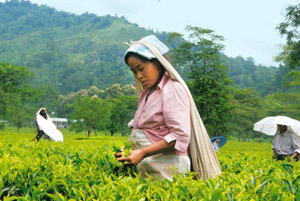
Economic Times | 13 Jun 2010
Ishani Duttagupta & Sutanuka Ghosal, ET Bureau
NEW DELHI/KOLKATA: Before the football, came the roses. And chances are that the flowers which were used during the inaugural of World Cup 2010 in Johannesburg came from the Ethiopian rose gardens of Sai Ramakrishna Karuturi.
Karuturi, a Bangalore businessman who has been acquiring land in African nations, has already become the biggest rose grower in the world, and one of the world’s biggest private land owners. Interestingly, he also owns Karuturi Sports, a Kenyan football club (earlier called Sher Agencies) that plays in the country’s premier league.
If Kenya had qualified this time around, one of Karuturi’s boys would have been in the team. His flowers made it though, thanks to his African pursuit.
What Karuturi started a few years ago has opened the floodgates for many Indian corporates. Several Indian companies have already leased land in Africa and many others too are eyeing opportunities in commercial agriculture in different countries in the continent.
“In many cases, Indian companies that already have a presence in Africa are looking at getting involved in the agricultural sector, even if they are not intrinsically farming majors. There are companies, which are doing large infrastructure projects, that are offered land holdings usually on lease. To enter commercial agriculture, such companies will have to look for expertise within the farming community,” says Shipra Tripathi, director and head of CII Africa.
The Tata group has been given a land lease in Uganda to run a pilot agricultural project, while the Jaipurias of RJ Corp have a lease of a 50-acre model dairy farm. The latter is already active in dairy products in African markets such as Uganda and Kenya.
Construction major Shapoorji Pallonji & Co has acquired the lease for 50,000 hectares of land in Ethiopia and may look at agricultural projects in future. And it’s not just large Indian companies, small and medium enterprises in sectors ranging from spices and tea to chemicals are looking at entering the commercial agriculture space in Africa.
There are roughly about 70 Indian companies which are already in the process of making a foray into the farming sector in Africa. The countries which offer big opportunities include Ethiopia, Malawi, Kenya, Uganda, Liberia, Ghana, Congo and Rwanda.
Various Indian tea companies, for instance, are making a beeline to acquire estates. BM Khaitan-owned McLeod Russel India, the largest integrated tea company in the world, has already taken the acquisition route with Uganda’s Rwenzori Tea Investments which it bought for $25 million (Rs 117 cr).
The acquisition is being carried out through Borelli Tea Holdings of the UK, which is a wholly-owned subsidiary of McLeod Russel India. The Rwenzori Tea Investments has six estates within its fold and can produce 15 million kg of tea annually.
“It is a profit making and dividend paying company. We are also scouting for gardens in Africa to expand our African production. Africa produces some of the best black teas in the world. Our aim is to control 8% marketshare of the global black tea market of 2 billion kg by 2015,” says Aditya Khaitan, managing director of McLeod.
Strengthening presence in Africa
BK BIRLA controlled Jay Shree Tea & Industries, which has recently acquired three tea gardens in East Africa, two in Rwanda and one in Uganda, is looking at increasing its presence in Africa.
“With these acquisitions, we have set our foot in Africa and our next job will be to strengthen our presence there through more acquisitions, both in Rwanda and Uganda. We are scouting for gardens there and will acquire estates at the right time and at the right opportunity,” says DP Maheswari, managing director of Jay Shree Tea & Industries.
Faced with the high price of tea garden acquisition in India, Rossell Tea is looking at possible acquisitions in Africa. “Any future acquisition is possible only outside the country,” says Harsh M Gupta, executive chairman of Rossell Tea.
“We are closely watching the gardens in countries such as Malawi, Kenya and Tanzania. If there is a good offer we are ready to grab that. Typically, we are looking at estates , which can produce 3.5 – 5 million kg of tea annually,” he adds.
Likewise, Dhunseri Tea & Industries is also eyeing acquisitions in Africa. CK Dhanuka, chairman of Dhunseri Tea says, “We have set our eyes on gardens in Africa. We will acquire gardens there at the right opportunity.”
While acquisitions may work for the tea sector, the right formula for Indian companies looking at commercial farming in Africa is through value-added products, feel experts. The perception about Indian companies in the African countries is that they generate local employment and engage in local skills development. The way forward will be to build on these advantages.
“We are looking at companies which will set up food processing units and contribute towards the food security in the region. Uganda will welcome not just large corporates, but even small companies from various Indian states who may wish to set up farming ventures. We are open to transfer of technology and value-added exports,” says Nimisha Madhvani, the high commissioner of Uganda in New Delhi.
The Indian government too is playing the role of facilitator in the African safari. “The business model for commercial farming in Africa will have to be through local investments and value-addition. Indian companies could even look at going beyond horticulture and floriculture and explore products such as oilseeds and pulses which will have a big market in India too,” says Gurjit Singh, joint secretary, East & South Africa, in the ministry of external affairs.










